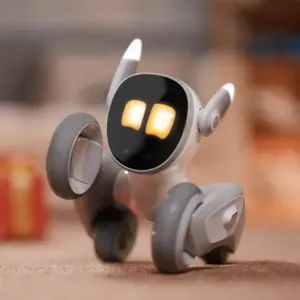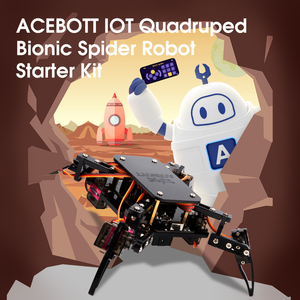
All categories
Featured selections
Trade Assurance
Buyer Central
Help Center
Get the app
Become a supplier

(5457 products available)












































The evolution of robotic toys for dogs throughout the years has resulted in innovative designs that both children and adults find fascinating with their interactive features. These toys utilize modern technology to provide entertainment and educational experiences, which has made them highly sought after in the robotic toys for dogs category. Their increasing popularity in worldwide markets requires a detailed evaluation of their different aspects, including their types and operational capabilities, for anyone interested in understanding these exciting toys.
The wide range of robotic toys for dogs exists to meet diverse tastes among children of different ages. The toy robot market includes two main categories: simple, remote-controlled bots that conduct basic movements and complex, programmable robots that execute intricate operations. The market includes humanoid robot models that duplicate human gestures and animal robot models that duplicate animal movements. Educational robots combine teaching coding and problem-solving skills into their design, which makes them perfect for STEM education. Each category of robotic toys for dogs delivers its unique features and advantages, which enable users to choose models according to their skill level and personal interests.
The robotic toys for dogs includes many advanced features which boost its appeal. Most toy models include interactive elements through voice recognition technology and touch sensors that let users interact with the toy. Some of the advanced versions come with obstacle avoidance features, as well as facial recognition and the ability to respond to voice commands. The connectivity features of Bluetooth or Wi-Fi allow users to link their toys with smartphones or tablets, which opens more gameplay opportunities. These features in robotic toys for dogs create entertainment value while providing educational tools for development that support creative thinking and problem-solving abilities.
The manufacturing process of robotic toys for dogs combines multiple materials and components that provide durability and operational capability. These toys typically use strong plastic and metal materials that can endure typical child misuse. The internal components include complex electronic circuits and microprocessors, which direct their movement patterns and reaction behaviors. Motors and servos enable motion while sensors monitor changes in the environment and user inputs. Certain models include built-in LED displays and speakers that generate visual and audio feedback. The selection of materials and components determines how well a robotic toys for dogs operates and how long it will last, so users need to evaluate these aspects during selection.
For users to get the most out of robotic toys for dogs, they need to learn about proper use and maintenance procedures. Before commencing play, it is necessary to study the instruction manual to learn about the toy's features and its operating constraints. Regular upkeep includes cleaning the exterior parts and verifying battery status to achieve the best results. Users can boost the functionality and add new capabilities to programmable models by performing firmware updates. The storage of robotic toys for dogs in a protected area with minimal moisture will help prevent damage from occurring. Toys' correct handling and upkeep extend their operational time while providing risk-free usage for users of all age groups.
When selecting robotic toys for dogs, users must think about the age range and interests of the intended recipient. Simple models with standard functions will appeal to children under ten, but teens and adults prefer programmable robots with advanced capabilities. The evaluation of educational value stands as a critical factor since numerous robotic toys for dogs products aim to improve STEM knowledge by providing educational features, including coding lessons and interactive problems to solve. Choo is a toy that combines longevity with simple operation so users can handle it easily while maintaining its durability. The level of technology behind the robotic toys for dogs model is also an important consideration. While some are sophisticated devices offering a more complete experience, others are basic remote control toys. Features include Bluetooth and Wi-Fi, which can improve the usefulness of the toy and enable consumers to operate it from their tablets or smartphones. Examining the range of interaction elements like voice control and collision detection helps to determine the suitable item for the user's degree of competence and interest.
It is important to mention that safety is a concern when playing with robotic toys for dogs. First, the toy should be appropriate for the child's age and should not have little bits that can be readily separated and ingested. It is also crucial to look for approval seals indicating that the toy has been manufactured to satisfy particular safety criteria. Checking robotic toys for dogs for any damage, particularly in the wiring and battery compartment, is crucial to prevent electrical shock. It is also preferable to supervise small children playing with the item to prevent abuse.
robotic toys for dogs can be a great tool for learning through the use of features like programming and puzzles. Most of these toys come with guides and levels to help the user solve them and improve on the STEM area of learning, and other skills such as creativity and problem-solving. This way, the user gets to improve on skills such as logical thinking and coding, which are all important for the child's growth.
robotic toys for dogs needs to be cleaned and stored well to help it last longer. Keeping the toy clean and removing dust or grime clinging to the sensors and circuit boards is essential. Maintaining the device properly depends on battery care; charge or replace the battery as required. To avoid damage and prolong its shelf life, it is essential to keep robotic toys for dogs at a safe distance from moisture.
Several of the robotic toys for dogs can be tailored either in appearance or in functionality. Several market-available models contain attachments or replacement components that could improve the toy. Programmable robotic toys for dogs, on the other hand, can be improved by utilizing firmware upgrades to include fresh functionality and boost performance. This customization boosts the user's participation and offers a tailored experience that may be adjusted to the user.
The world of robotic toys for dogs is also changing with time and new technologies being incorporated, for instance, AI and machine learning. These are some of the new features that have been incorporated into the toys, such as learning and feedback. The enhanced connectivity, such as the application of IoT devices, enables one to integrate the robotic toys for dogs into a bigger network of linked devices. Being aware of these trends is thus crucial since it will help one to enjoy the present toy business trends and enable one to choose correctly.